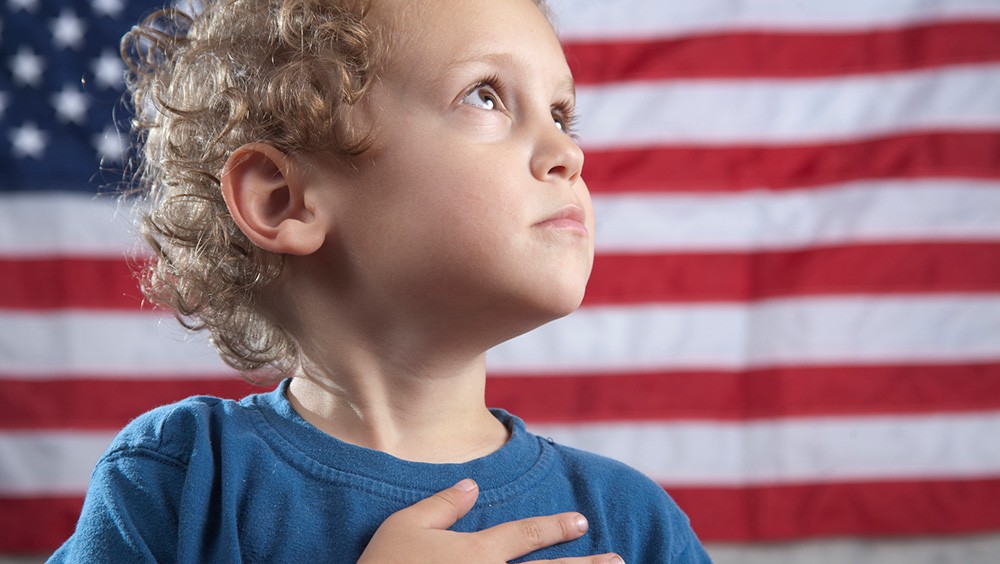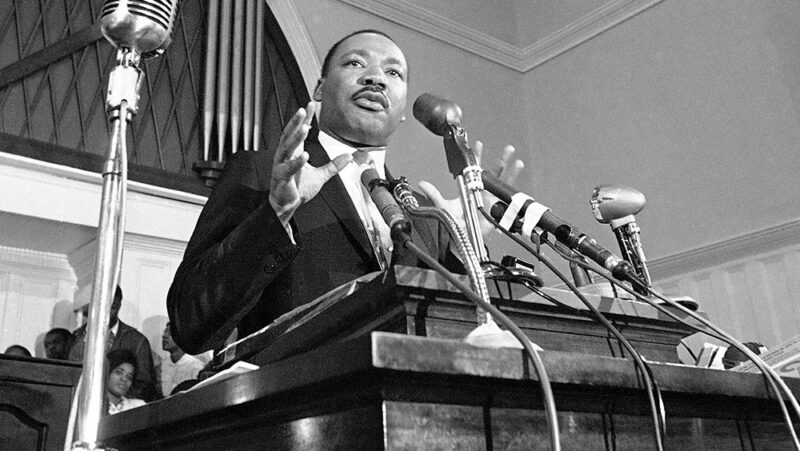Pledge of Allegiance in Schools: Do Students Have to Stand?

Every day in public schools across the country, students stand, place their hands over their hearts and recite the Pledge of Allegiance.
But many students might not know that it is possible to opt out of saying the pledge.
Here's everything you need to know about the Pledge of Allegiance in schools, including requirements by state, examples throughout history, and much more.
Do public school students have to stand for the Pledge of Allegiance?
No. Public school students can opt out of saying the pledge (in some states, only with permission from a parent). The First Amendment protects the right not to stand for the Pledge of Allegiance.
However, private school students can be required to stand for the pledge as private schools are not bound by the First Amendment.
Why don't public school students have to stand for the pledge?
The First Amendment protects freedom of speech. Free speech means that the government cannot punish people for what they say. It also means that the government cannot punish people for choosing not to speak or force them to speak.
Freedom of speech has limits, but there are strict guidelines in place that make it difficult for the government to impose them. It is especially hard for the government to regulate speech about political views – like saying the pledge.
Similarly, saying the pledge could violate some students’ religious beliefs. For example, students who do not believe in God may decline to say “under God.”
RELATED: The complete guide to free speech in schools
Can students still get in trouble for not saying the pledge?
Students who opt out of the pledge may not disrupt the pledge as others say it. Public school students may be punished if they disrupt school or interfere with others’ rights. Talking, making noises, engaging in distracting behavior or just generally being rude and offensive while others are saying the pledge could be punished.
Most states – 46 out of 50 – do have some requirement that the pledge be recited in schools. These requirements usually state that schools must set aside a time during which students will be led in the pledge, or else schools may be penalized.
In 34 states, there are stated exemptions or requirements that schools remind students that they cannot be forced to say the pledge.
In four states – Florida, Pennsylvania, Texas and Utah – permission from a parent or guardian is required to opt out of saying the pledge. However, in March 2022, a Texas student who refused to write the pledge as part of a classroom assignment won a $90,000 lawsuit against a teacher.
In eight states – California, Delaware, Georgia, Illinois, Kansas, Massachusetts, Nevada and New Mexico – classroom pledge requirements do not explain how students can opt out. Students in those states could challenge the requirement on First Amendment grounds, if required to say the pledge in violation of their beliefs.
Four states – Arizona, Hawaii, Vermont and Wyoming – do not currently require schools to set aside time for saying the pledge.
| Exemptions allowed | Parents' permission required to opt out | No stated exemptions | No pledge requirement | ||
| Alabama | Michigan | Oklahoma | Florida | California | Arizona |
| Alaska | Minnesota | Oregon | Pennsylvania | Delaware | Hawaii |
| Arkansas | Mississippi | Rhode Island | Texas | Georgia | Vermont |
| Colorado | Missouri | South Carolina | Utah | Illinois | Wyoming |
| Connecticut | Montana | South Dakota | Kansas | ||
| Idaho | Nebraska | Tennessee | Massachusetts | ||
| Indiana | New Hampshire | Virginia | Nevada | ||
| Iowa | New Jersey | Washington | New Mexico | ||
| Kentucky | New York | West Virginia | |||
| Louisiana | North Carolina | Wisconsin | |||
| Maine | North Dakota | ||||
| Maryland | Ohio | ||||
How did the right not to stand for the pledge come to be protected?
In the 1930s, Pennsylvania law required public school students to stand, salute the flag and recite the pledge in class each day. Two children, Billy Gobitas, age 10, and his sister Lillian, age 12, declined to do so because it would violate their religious beliefs as Jehovah’s Witnesses. They were expelled from school. Billy wrote a letter to the school board explaining his right to practice his faith. The family sued on First Amendment religious freedom grounds.
In 1940, the Supreme Court sided with the school and upheld Pennsylvania’s law in Minersville School District v. Gobitis (the students’ last name was misspelled in the court ruling). The court said the pledge could be required to support national unity. Only one judge disagreed, saying the students should not be forced to express something that violated their deepest beliefs.
In the following years, many Jehovah’s Witnesses faced persecution and even violence because of their beliefs.
Three years later, the Supreme Court heard a similar case. Sisters Gathie and Marie Barnett, ages 9 and 8, were also Jehovah’s Witnesses who declined to say the pledge. They were expelled from their West Virginia public school. The state threatened to send them to reform school and send their parents to jail.
The Jehovah’s Witnesses challenged West Virginia’s law requiring students to say the pledge. This time, the Supreme Court ruled in 1943 in West Virginia State Board of Education v. Barnette (the family’s name was misspelled in the court filing) that this law violated students’ First Amendment free speech rights.
What’s the bottom line on the Pledge of Allegiance in schools?
Public schools must uphold the First Amendment. They cannot violate free speech rights by punishing or requiring speech unless they have a strong reason for doing so. That is usually by identifying some harm the speech will cause and prohibiting only the speech they identify as harmful and nothing more.
But public schools also have some leeway to regulate students’ speech in the interest of education.
Public school students cannot goof off and disrupt class during the pledge. Students may need a stronger reason to opt out than not feeling like participating on a given day. But students whose beliefs mean they do not agree with the statements in the pledge cannot be required to say it. Such a requirement would violate their First Amendment rights, and freedom of speech protects the right to stay silent.
25 Black Civil Rights Activists Who Used the Power of the First Amendment
Related Content

